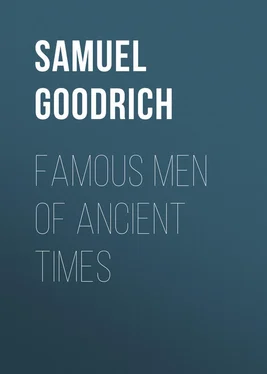Samuel Goodrich - Famous Men of Ancient Times
Здесь есть возможность читать онлайн «Samuel Goodrich - Famous Men of Ancient Times» — ознакомительный отрывок электронной книги совершенно бесплатно, а после прочтения отрывка купить полную версию. В некоторых случаях можно слушать аудио, скачать через торрент в формате fb2 и присутствует краткое содержание. Жанр: foreign_prose, на английском языке. Описание произведения, (предисловие) а так же отзывы посетителей доступны на портале библиотеки ЛибКат.
- Название:Famous Men of Ancient Times
- Автор:
- Жанр:
- Год:неизвестен
- ISBN:нет данных
- Рейтинг книги:5 / 5. Голосов: 1
-
Избранное:Добавить в избранное
- Отзывы:
-
Ваша оценка:
- 100
- 1
- 2
- 3
- 4
- 5
Famous Men of Ancient Times: краткое содержание, описание и аннотация
Предлагаем к чтению аннотацию, описание, краткое содержание или предисловие (зависит от того, что написал сам автор книги «Famous Men of Ancient Times»). Если вы не нашли необходимую информацию о книге — напишите в комментариях, мы постараемся отыскать её.
Famous Men of Ancient Times — читать онлайн ознакомительный отрывок
Ниже представлен текст книги, разбитый по страницам. Система сохранения места последней прочитанной страницы, позволяет с удобством читать онлайн бесплатно книгу «Famous Men of Ancient Times», без необходимости каждый раз заново искать на чём Вы остановились. Поставьте закладку, и сможете в любой момент перейти на страницу, на которой закончили чтение.
Интервал:
Закладка:
In this state of things, the news suddenly came, that 40,000 men, the flower of the Persian army, commanded by Firouz, was marching upon Dara. Confident of victory, the Persian general announced his approach, by the haughty message that a bath should be ready for him at Dara the next evening. Belisarius made no other reply than preparations for battle. Fortifying himself in the best manner he was able, he awaited the onset; exhorting his men, however, by every stimulating motive he could suggest, to do honor to the name and fame of Rome.
The battle began by a mutual discharge of arrows, so numerous as to darken the air. When the quivers were exhausted, they came to closer combat. The struggle was obstinate and bloody; and the Persians were already about to win the victory, when a body of horse, judiciously stationed behind a hill by Belisarius, rushed forward, and turned the tide of success. The Persians fled, and the triumph of Belisarius was complete. They left their royal standard upon the field of battle, with 8000 slain. This victory had a powerful effect, and decided the fate of the campaign.
The aged Kobad, who had conceived a profound contempt for the Romans, was greatly irritated by the defeat of his troops. He determined upon a still more powerful effort, and the next season sent a formidable army to invade Syria. Belisarius, with a promptitude that astounded he enemy, proceeded to the defence of this province, and, with an inferior force, compelled the Persian army to retreat. Obliged at length, by his soldiers, against his own judgment, to give battle to the enemy, he suffered severely, and only avoided total defeat by the greatest coolness and address. Even the partial victory of the enemy was without advantage to them, for they were obliged to retreat, and abandon their enterprise. Soon after this event, Kobad died, in his eighty-third year, and his successor, Nushirvan, concluded a treaty of peace with Justinian.
The war being thus terminated, Belisarius took up his residence at Constantinople, and here became the second husband of Antonina, who, though the child of an actress, had contracted an exalted marriage on account of her beauty, and having filled a high office, enjoyed the rank and honors of a patrician. While thus raised above the dangerous profession of her mother, she still adhered to the morals of the stage. Though openly licentious, she obtained through her bold, decided, and intriguing character, aided by remarkable powers of fascination, a complete ascendancy over Belisarius. It is seldom that a man is great in all respects, and the weakness of the general whose history we are delineating, was exhibited in a blind and submissive attachment to this profligate woman.
A singular outbreak of popular violence occurred about this period, which stained the streets of Constantinople with blood, and threatened for a time to hurl Justinian from his throne. The fondness of the Romans for the amusements of the circus, had in no degree abated. Indeed, as the gladiatorial combats had been suppressed, these games were frequented with redoubled ardor. The charioteers were distinguished by the various colors of red, white, blue, and green, intending to represent the four seasons. Those of each color, especially the blue and green, possessed numerous and devoted partisans, which became at last connected with civil and religious prejudices.
Justinian favored the Blues, who became for that reason the emblem of royalty; on the other hand, the Greens became the type of disaffection. Though these dangerous factions were denounced by the statutes, still, at the period of which we speak, each party were ready to lavish their fortunes, risk their lives, and brave the severest sentence of the laws, in support of their darling color. At the commencement of the year 532, by one of those sudden caprices which are often displayed by the populace, the two factions united, and turned their vengeance against Justinian. The prisons were forced, and the guards massacred. The city was then fired in various parts, the cathedral of St. Sophia, a part of the imperial palace, and a great number of public and private buildings, were wrapped in conflagration. The cry of " Nika! Nika! " Vanquish! Vanquish! ran through every part of the capital.
The principal citizens hurried to the opposite shore of the Bosphorus, and the emperor entrenched himself within his palace. In the mean time, Hypatius, nephew of the emperor Anastatius, was declared emperor by the rioters, and so formidable had the insurrection now become, that Justinian was ready to abdicate his crown. For the first and last time, Theodora seemed worthy of the throne, for she withstood the pusillanimity of her husband, and, through her animated exhortations, it was determined to take the chance of victory or death.
Justinian's chief hope now rested on Belisarius. Assisted by Mundus, the governor of Illyria, who chanced to be in the capital, he now called upon the guards to rally in defence of the emperor; but these refused to obey him. Meanwhile, by another caprice the party of the Blues, becoming ashamed of their conduct, shrunk one by one away, and left Hypatius to be sustained by the Greens alone.
These were dismayed at seeing Belisarius, issuing with a few troops which he had collected, from the smoking ruins of the palace. Drawing his sword, and commanding his veterans to follow, he fell upon them like a thunderbolt. Mundus, with another division of soldiers, rushed upon them from the opposite direction. The insurgents were panic-struck, and dispersed in every quarter. Hypatius was dragged from the throne which he had ascended a few hours before, and was soon after executed in prison. The Blues now emerged from their concealment, and, falling upon their antagonists, glutted their merciless and ungovernable vengeance. No less than thirty thousand persons were slain in this fearful convulsion.
We must now turn our attention to Africa, in which the next exploits of Belisarius were performed. The northern portion of this part of the world, known to us by the merited by-word of Barbary, hardly retains a trace of the most formidable rival and opulent province of Rome. After the fall of Jugurtha, at the commencement of the second century, it had enjoyed a long period of prosperity and peace – having escaped the sufferings which had fallen upon every other portion of the empire. The Africans in the fifth century were abounding in wealth, population, and resources. During the minority of Valentinian, Boniface was appointed governor of Africa. Deceived by Ætius into a belief of ingratitude on the part of the government at home, he determined upon resistance, and with this view, concluded a treaty with the Vandals in the southern portion of Spain.
These, embarking from Andalusia, whose name still denotes their former residence, landed at the opposite cape of Ceuta, A. D. 429. Their leader was the far-famed Genseric, one of the most able, but most lawless and bloody monarchs recorded in history. Of a middle stature, and lamed by a fall from his horse, his demeanor was thoughtful and silent; he was contemptuous of luxury, sudden in anger, and boundless in ambition. Yet his impetuosity was always guided and restrained by cunning. He well knew how to tempt the allegiance of a foreign nation, to cast the seeds of future discord, or to rear them to maturity.
The barbarians on their passage to Africa consisted of 50,000 fighting men, with a great crowd of women and children. Their progress through the African province was rapid and unopposed, till Boniface, discovering the artifices of Ætius, and the favorable disposition of the government of Rome, bitterly repented the effects of his hasty resentment. He now endeavored to withdraw his Vandal allies; but he found it less easy to allay, than it had been to raise, the storm. His proposals were haughtily rejected, and both parties had recourse to arms. Boniface was defeated, and in the event, Genseric obtained entire possession of the Roman provinces in Africa.
Читать дальшеИнтервал:
Закладка:
Похожие книги на «Famous Men of Ancient Times»
Представляем Вашему вниманию похожие книги на «Famous Men of Ancient Times» списком для выбора. Мы отобрали схожую по названию и смыслу литературу в надежде предоставить читателям больше вариантов отыскать новые, интересные, ещё непрочитанные произведения.
Обсуждение, отзывы о книге «Famous Men of Ancient Times» и просто собственные мнения читателей. Оставьте ваши комментарии, напишите, что Вы думаете о произведении, его смысле или главных героях. Укажите что конкретно понравилось, а что нет, и почему Вы так считаете.












